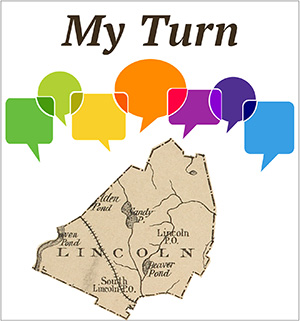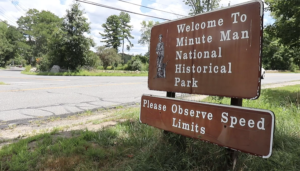By Anne Sobol
 On May 1, the National Trust for Historic Preservation designated Minute Man National Park, Walden Pond, and nearby landmarks as one of “America’s 11 Most Endangered Historic Places” due to plans to expand infrastructure for luxury private jets at Hanscom Field.
On May 1, the National Trust for Historic Preservation designated Minute Man National Park, Walden Pond, and nearby landmarks as one of “America’s 11 Most Endangered Historic Places” due to plans to expand infrastructure for luxury private jets at Hanscom Field.
National Trust designations of this sort have been remarkably successful over the years in protecting designated landmarks. The Trust urges people to sign their petition to Governor Maura Healey and Secretary of Transportation Pete Buttigieg requesting that they do whatever they can to stop the expansion. The Federal Aviation Administration under Secretary Buttigieg could play an important part in how this turns out.
The developers seek to double hangar space at the field, adding over 500,000 square feet of infrastructure and trucking in between 10,000 and 20,000 gallons of jet fuel every day. Developers acknowledge neither the climate impact of the greenhouse gas emissions from the jets burning massive amounts of jet fuel nor the noise disruption of some of the nation’s most historic sites. Depending on their size, private jets burn between 330 and 550 gallons of jet fuel per hour.
Estimates of the number of jets that will be hangared in the 18 hangars range from 50 to 79. The most recent annual data from Massport states that there were 38,400 jet “operations” (landings and takeoffs) at Hanscom. This figure would only go up because of the private jets in the new hangars. An annual figure of 38,400 translates to more than 100 takeoffs or landings per day. Developers have said without explanation that the daily number will increase by 12 flights or using their figure by around 10 per cent. It could well be more.
The National Trust emphasizes the noise disruption to visitors to the national park and to Walden Pond. Private jets cruising in for a landing or straining to take off will destroy the peace and quiet of visitors walking to the Old North Bridge, walking on the trails in the fields and woods along Route 2A, or enjoying Great Meadows National Wildlife Refuge.
Please take the time to sign the National Trust petition on their website at savingplaces.org. Click here for the direct link to the petition.
“My Turn” is a forum for readers to offer their letters to the editor or views on any subject of interest to other Lincolnites. Submissions must be signed with the writer’s name and street address and sent via email to lincolnsquirrelnews@gmail.com. Items will be edited for punctuation, spelling, style, etc., and will be published at the discretion of the editor. Submissions containing personal attacks, errors of fact, or other inappropriate material will not be published.








